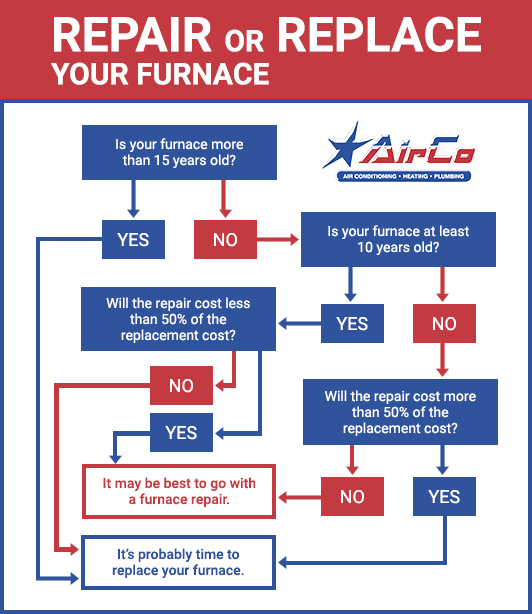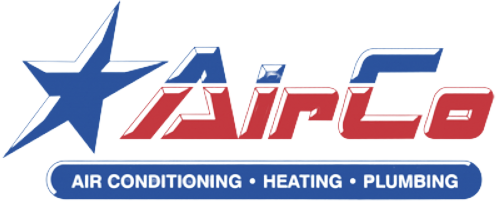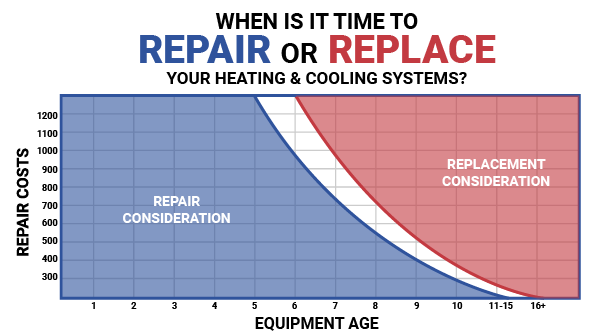
Replacing vs. Repairing Your HVAC Unit
Is your furnace or air conditioner on the fritz? Is repair all that you need? Or, is it time to look into a replacement system that is more dependable and efficient? New equipment would replace your poorly performing HVAC unit with a more efficient, dependable system, but you don’t want to replace it prematurely. Repairs cost less than replacements, but if you’re paying to keep your old system hobbling along, it may be less cost-effective in the long run.
Should You Repair or Replace Your HVAC System?
If you’re undecided, answer these questions to help you make an informed decision.
How old is your current HVAC system?
0 to 9 years old: Your HVAC equipment most likely has years of life left. Seriously consider a repair over a replacement.
10 to 13 years old: Some high-use heating and air conditioning systems wear out after about a decade. However, if you have taken proper care of your equipment over the years, it may have plenty of life left.
14 to 20 years old: This is the average life span of well-maintained HVAC equipment. A breakdown at this age may warrant a replacement.
What is the repair cost?
Less than 50% of the replacement cost: If your HVAC equipment is under 10 years old and the repair bill is less than half of the cost to replace it, a repair is most likely the right choice. If you have also taken good care of your 10- to 13-year-old system, an affordable repair could be worth the cost.
More than 50% of the replacement cost: It’s hard to swallow a costly repair bill, no matter your equipment’s age. It is probably worth spending the money on a system that’s under 10 years old, but consider a replacement if the repair cost is high and you’ve had your equipment for over a decade.
How often does the HVAC system break down?
Less than once a year: Has your unit been running without a hitch until now? This breakdown is probably a fluke, and a repair is most likely worth it.
Once a year or more: Do you find yourself requesting emergency repairs every few months? It could be more cost-effective to invest in a new, reliable HVAC system.
What is your air conditioner’s efficiency rating?
14 SEER or higher: SEER, or Seasonal Energy Efficiency Ratio, tells how efficiently your air conditioner operates. 14 SEER is a respectable efficiency and will keep your costs relatively low, so a system with this rating may be worth repairing.
13 SEER or lower: If you upgrade your 15-year-old 12 SEER air conditioner to a new 16 SEER unit, you can save 25% on your cooling costs every year. Efficiency ratings top out at 25 SEER, so the maximum potential for energy savings is even higher.
What is your furnace’s efficiency rating?
80 AFUE or higher: AFUE, or Annual Fuel Utilization Efficiency, measures furnace performance. If your furnace is rated 80 AFUE or higher, your heating costs should be relatively low, and your system may be worth repairing.
78 AFUE or lower: Upgrading your 20-year-old 60 AFUE furnace to a new 90 AFUE unit could save you 33% on your heating costs. The most efficient furnaces operate at about 98 AFUE for maximum savings.
Are your energy bills increasing suddenly?
No: This means your HVAC system is still operating close to peak performance, and a repair is most likely worthwhile.
Yes: Energy costs may go up, causing your bills to rise over the years, but your usage should not increase suddenly. Unexplained upticks in heating and cooling costs could mean your HVAC system is in a downward spiral, and a replacement is imminent.
Whether you’re considering an air conditioner repair or replacement, or you need a heating system repair or replacement, AirCo has you covered. We offer a 100% comfort guarantee on all the repair work we perform, as well as flexible financing options on today’s top HVAC brands if you opt for a replacement.
Contact us to schedule an HVAC repair or installation estimate today!

The Benefits of Proper Maintenance
Tune-ups have a direct effect on your heating and cooling system’s reliability, efficiency, and longevity. It’s estimated that half of all costly breakdowns could be avoided simply by keeping up with preventative maintenance. You could add years to your system’s life span by following these steps:
- Change the air filter every one to three months.
- Trim back vegetation and remove other obstructions from around the outdoor unit to maintain adequate airflow.
- Make sure furniture, rugs, and drapes don’t block return registers. Also, keep at least 80% of your supply registers open at all times.
- Schedule two maintenance visits per year to keep your system(s) running efficiently and dependably.
For maximum savings and benefits, consider signing up for an All Star Club membership. In addition to two maintenance visits per year, you also enjoy a Lifetime Guarantee on repairs, discounts on HVAC repairs and accessories, flexible scheduling, and a VIP phone number for direct access to our Customer Experience Team.
Contact us today to learn more!
Your Neighbors Trust Our Expertise
Total Reviews
Google Rating
“Fabulous service and the BEST people! The people are stellar!”
Laura W.

